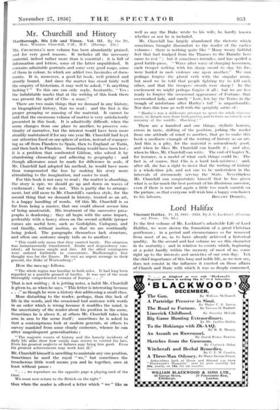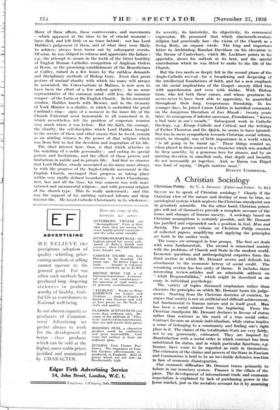Lord Halifax
Viscount Halifax. Pt. 11, 1885-1934. By J. G. Lockhart. (Center'. ary Press. 12s. 6d.) Ix the first volume of Mr. Lockhart's admirable Life of Lord Halifax, we were shown the formation of a great Christian gentleman ; in a period and circumstances so far removed from most of us, as to have already achieved a historical quality. In the second and last volume we sec this character in its maturity ; and in relation to events which, beginning at a point hardly within the memory of most of us, come right up to the interests and anxieties of our own day. Yet the chief importance of this long and noble life, as we now see, does not consist in the influence it exerted on those affairs of Church and State with which it was so deeply concerned, Many of these affairs, these controversies, and movements —which appeared at the time to be of crucial moment— • have died, and left little or no trace behind ; nor has Lord Halifax's judgement of them, and of what they were likely to achieve, always been borne out by subsequent events. Of some, he was obliged to witness and appreciate the failure e.g., the attempt to secure in the teeth of the bitter hostility of English Roman Catholics recognition of Anglican Orders at Rome, or the promising establishment of the Benedictines at Caldey, ruined in a few hours by the ruthless demands and disciplinary methods of Bishop Gore. Even that great; gesture of mutual charity with which his name will always be associated, the Conversations at Malines, is now seen to have been the effort of a few ardent spirits ; in no sense representative of the common mind—still less, the common • temper—of the Latin or the English Church. In his memorial window, Halifax kneels with Mercier, and in the treasury of York Minster is a chalice, in which is embedded the great Cardinal's ring : signs of a moment in the inner life of the Church Universal most honourable to all concerned in it, which nevertheless left the problem of corporate reunion very much where it was before. But the faith, the courage, the charity, the self-discipline which Lord Halifax brought to the service of these and other causes that he loved, remain as an abiding witness to the power of that religion which was from first to last the devotion and inspiration of his life.
The chief interest here, then, is that which attaches to the watching of a noble personality ; and noting its special powers and limitations, and the :effect of these powers and limitations in public and in private life. And first we observe that Lord Halifax, closely associated as his name must always be with the progress of the Anglo-Catholic movement in the English Church, envisaged that progress as taking -place within very rigidly defined boundaries. A strict Churchman, first, last and all the time, his true concern was with insti- tutional and sacramental religion ; and with personal religion of the church type. This he really understood ; and this was the support of. his untiring outward labours and deep. interior life. He loved Catholic Christianity in its wholeness :
its severity, its historicity, its objectivity, its ceremonial expression. He possessed that which nineteenth-century religion had practically lost—the vision of the ,Church as a living Body, an organic whole. The long and important letter to Archbishop Randall Davidson on his elevation to the throne of Canterbury, which Mr. Lockhart prints in his appendix, shows his outlook at its best, and the special contribution which he was fitted to make to the life of the Church.
But the two needs so deeply felt in the second phase of the Anglo-Catholic revival—for a broadening and deepening of the intellectual foundations of faith, and for a new emphasis on the social implications of the Gospel—merely filled him with apprehension and even with dislike. With Bishop Gore,. who led both these causes, and whose greatness he seems never to have been able to appreciate, he quarrelled throughout their long, tempestuous friendship. In his younger days, he joined Canon Liddon in horrified comments on the dangerous liberalism of Lux Mundi; twenty years later, its courageous if inferior successor, Foundations," leaves a bad taste in one's mouth." Subsequent work in Catholic theology, e.g., Essays Catholic and Critical, and the writings of Father Thornton and Dr. Quick, he seems to have ignored. Nor was he more sympathetic towards Christian social reform, which, he thought, was of little importance in a world which " is all going to be burnt, up." These things remind us, when placed in their context in a character which was marked by deep sanctity, by a generous love for sinners, and by an untiring devotion to unselfish ends, that depth and breadth do not necessarily go together. And, as Baron von Hiigel was fond of saying, Depth matters most."
EVELYN UNDERHILL.















































 Previous page
Previous page